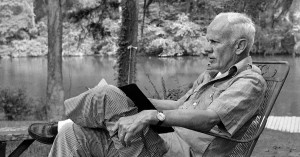Thanks to writer Kevin Rabalais for sharing this short tribute I wrote to Walker Percy on his blog Sacred Trespasses.
Here’s the full text:
In Part 2 of our guest posts on reading New Orleans, novelist George Bishop discusses Walker Percy’s timeless novel of despair, movies and the search:
Walker Percy’s The Moviegoer: An Appreciation
New Orleans was always our Paris, our Emerald City, our Rome. I grew up a hundred miles away in the small town of Jackson, Louisiana, and then Baton Rouge, and the rare excursion to the big city was always an adventure for us. New Orleans was exotic, rich, dirty, dangerous, debauched, historic, decrepit, rowdy, bohemian . . . We loved it.
I eventually moved to New Orleans to attend college at Loyola University, and it was there that I first read Walker Percy. The Alabama-born author, who lived across Lake Pontchartrain in Covington, had once taught at Loyola, and his novels turned up regularly on reading lists in the English Department. I’m glad they did: Percy’s The Moviegoer, which won the U.S. National Book Award in 1962, became a revelation for me, offering a wholly new way of seeing the city.
The story, set in mid-century New Orleans, is narrated by Binx Bolling, a young single man who may or may not be suffering from PTSD after military service in Korea. Binx is on a quest, his “search,” as he tells us early on:
“What is the nature of the search? you ask. Really it is very simple, at least for a fellow like me; so simple that it is easily overlooked. The search is what anyone would undertake if he were not sunk in the everydayness of his own life. . . . To become aware of the possibility of the search is to be onto something. Not to be onto something is to be in despair.”
And from there, without any drama or gun fights or chase scenes (there’s one car wreck, but a mild one), Binx pokes around, wandering here and there, in and out of the city, its neighborhoods and movie houses, looking for . . . something. The evidence that he’s not alone, the small events and accidents that might lift him and others out of the numbing everydayness of their lives. He’s Holden Caulfield grown up and moved from New York to New Orleans, his red hunting cap traded for a stockbroker’s suit, his Central Park replaced by Audubon Park, but his dissatisfaction and skepticism the same.
This, I thought, was a New Orleans I might feel at home in.
I went on to read everything else of Percy’s I could get my hands on, and finally, after decades of travel, I moved back here. I live and write in the Bywater neighborhood now, and I still like to re-read The Moviegoer from time to time. It helps remind me that besides its hurricanes and floods, its Mardi Gras and Bourbon Street, its tourists and drunks, its stubborn poverty and violence and racism and classism, New Orleans can also provide, for those who need it, a quiet, thoughtful, brooding place.
A good place, Binx would say, for searching.
* * *
George Bishop is the author of Letter to My Daughter and The Night of the Comet. The Night of the Comet has received widespread praise since its release, with glowing reviews in People, The New York Post, Kirkus Reviews, Shelf Awareness and Publishers Weekly, among others. It was a featured selection in Reuters “Book Talk” column and was chosen as the September book of the month for National Public Radio’s “The Radio Reader.” Kirkus Reviews named it one of the “Best Books of 2013.”
Booklist calls The Night of the Comet “A quiet, occasionally bittersweet novel about the differences between desire and disappointment, expectation and reality.”
With thanks to Rhoda K. Faust for permission to reprint her photograph of Walker Percy.
To receive notifications of new posts from Sacred Trespasses, please sign up via our contact page with the subject “Subscribe.”
